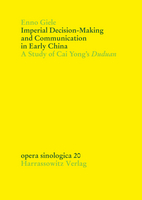|
|
more titles of the subject:
Download:
The emerging Chinese empire was faced with a dilemma typical for empires, be they Roman, Mesopotamian, or Carolingian. The realm was “won on horseback, but could not be ruled from horseback,” as an advisor of the Han dynasty put it. Military conquest had to be buttressed by a convincing legitimation of the supreme rule, including certain forms of power sharing, as well as by the establishment of a courtly protocol and a bureaucracy that provided for both a smooth operation of government and checks and balances. Here, the communication to and from the imperial court attained a crucial role. This study identifies the characteristics of different types of documents - imperial edicts as well as memorials, petitions, etc. - that helped to shape imperial policies. It contrasts a classification of documents by the famous intellectual Cai Yong (second century A.D.) with the remnants of courtly communication in the received sources and is able for the first time to make sense of the terse explanations that have long baffled historians of ancient China.
|






